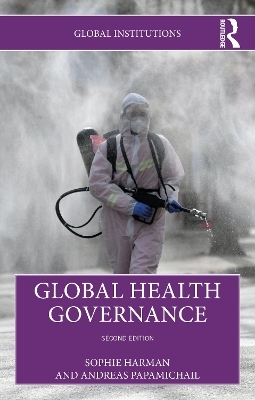
Global Health Governance
Seiten
2024
|
2nd edition
Routledge (Verlag)
978-1-138-56036-9 (ISBN)
Routledge (Verlag)
978-1-138-56036-9 (ISBN)
Fully updated for the second edition, this text provides a concise and informative introduction to how global health is governed, exploring the ways in which we understand global health governance, exposing its complex nature, and asking who or what really governs global health, to what outcome, and for whom.
Governing outbreaks, emergencies, pandemics, access to medicines, non-communicable diseases, and the financing of fully functioning health systems remain among the biggest challenges national and international policymakers and practitioners face. While COVID-19 made apparent the tensions, contestations, and complexity of governing health threats, to understand what could and should have worked during the pandemic requires a comprehensive understanding of the actors, approaches, and issues that make up global health.
Divided into three parts, the book examines the different actors who participate in global health governance, their powers, interests, ways of working, relationships, and how their roles have changed over time. It explores different approaches to global health governance, focusing on the ways global health issues have been conceptualised and understood, and how this has shaped global health politics and the ways the key actors work. Finally, it examines different issues, and how the actors and their approaches have addressed health emergencies and everyday health inequities.
Global Health Governance provides a comprehensive introduction to researchers and students new to the field of global health governance, and a vital resource and reference point for established scholars and practitioners working in the field of global health.
Governing outbreaks, emergencies, pandemics, access to medicines, non-communicable diseases, and the financing of fully functioning health systems remain among the biggest challenges national and international policymakers and practitioners face. While COVID-19 made apparent the tensions, contestations, and complexity of governing health threats, to understand what could and should have worked during the pandemic requires a comprehensive understanding of the actors, approaches, and issues that make up global health.
Divided into three parts, the book examines the different actors who participate in global health governance, their powers, interests, ways of working, relationships, and how their roles have changed over time. It explores different approaches to global health governance, focusing on the ways global health issues have been conceptualised and understood, and how this has shaped global health politics and the ways the key actors work. Finally, it examines different issues, and how the actors and their approaches have addressed health emergencies and everyday health inequities.
Global Health Governance provides a comprehensive introduction to researchers and students new to the field of global health governance, and a vital resource and reference point for established scholars and practitioners working in the field of global health.
Sophie Harman is Professor of International Politics at Queen Mary University of London, UK. Andres Papamichail is Lecturer in Global Health & International Relations at Queen Mary University of London, UK.
Introduction
Part I: Global Health Governance Actors
Chapter 1: Public Actors in Global Health Governance
Chapter 2: Private Actors in Global Health Governance
Part II: Approaches to Global Health Governance
Chapter 3: Approaches to Global Health Governance
Chapter 4: Global Health Security
Part III: Global Health Governance Issues
Chapter 5: Health Emergencies and Crises
Chapter 6: Global Priorities and Local Neglect
Conclusion
| Erscheinungsdatum | 10.07.2024 |
|---|---|
| Reihe/Serie | Global Institutions |
| Zusatzinfo | 4 Tables, black and white; 2 Line drawings, black and white; 2 Illustrations, black and white |
| Verlagsort | London |
| Sprache | englisch |
| Maße | 138 x 216 mm |
| Gewicht | 340 g |
| Themenwelt | Sachbuch/Ratgeber ► Gesundheit / Leben / Psychologie |
| Medizin / Pharmazie ► Gesundheitswesen | |
| Studium ► Querschnittsbereiche ► Prävention / Gesundheitsförderung | |
| Sozialwissenschaften ► Politik / Verwaltung | |
| ISBN-10 | 1-138-56036-7 / 1138560367 |
| ISBN-13 | 978-1-138-56036-9 / 9781138560369 |
| Zustand | Neuware |
| Haben Sie eine Frage zum Produkt? |
Mehr entdecken
aus dem Bereich
aus dem Bereich
das Manual zur psychologischen Gesundheitsförderung
Buch | Hardcover (2023)
Springer Berlin (Verlag)
39,99 €
Orthomolekulare Medizin in Prävention, Diagnostik und Therapie
Buch | Hardcover (2022)
Thieme (Verlag)
71,00 €


